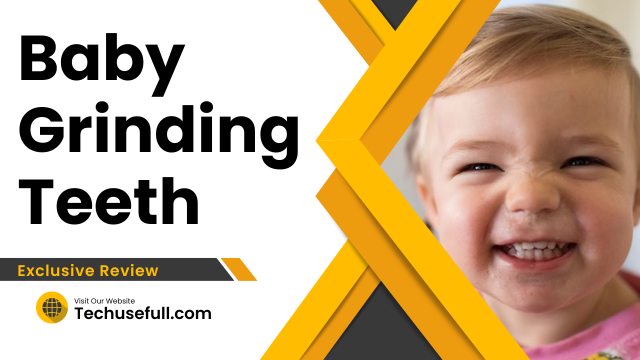Teething is a significant developmental milestone in a baby’s life, often accompanied by a host of changes and challenges.
One of these challenges that parents may encounter is the phenomenon of baby teeth grinding, medically known as bruxism. It’s not uncommon for parents to feel concerned or curious when they hear their little one grinding their newly emerged teeth.

While this behavior can be disconcerting, it’s essential to understand that, in many cases, it’s a normal part of the teething process.
In fact, studies suggest that nearly 30% of infants may experience some form of bruxism during their early years as they cut their first teeth (American Academy of Pediatrics, 2019).
This article delves into the various facets of baby teeth grinding, offering insights into its common causes, when to be concerned, and strategies for addressing this often perplexing issue.
What If Baby Grinding Teeth?

Babies grinding their teeth, a condition known as bruxism, is relatively common and usually not a cause for concern, especially in infants who have just started teething. Here are some potential reasons and considerations:
- Teething: The most common reason for babies to grind their teeth is teething. As new teeth emerge, the sensation can lead to grinding or gnashing. This is typically a temporary behavior and should improve as the teething process progresses.
- Exploration: Babies often use their mouths to explore the world around them. Grinding their teeth may be a way for them to discover the sensation of their emerging teeth or simply explore how their mouth feels.
- Stress or discomfort: Some babies may grind their teeth as a response to stress, discomfort, or pain. This could be due to issues like earaches, allergies, or sinus congestion. If you suspect your baby is grinding their teeth due to discomfort, it’s important to consult a pediatrician to address any underlying issues.
- Misalignment: In rare cases, babies may have dental or jaw alignment issues that cause them to grind their teeth. If you notice persistent grinding, it may be a good idea to consult a pediatric dentist to rule out any potential problems.
- Habitual behavior: In some cases, babies may develop the habit of grinding their teeth, even after teething has completed. This can continue into childhood if not addressed.
If you’re concerned about your baby’s teeth grinding, it’s a good idea to consult your pediatrician or a pediatric dentist.
They can examine your baby’s teeth and jaw to rule out any underlying issues and offer guidance on how to manage or address the behavior if necessary.
In most cases, though, baby teeth grinding is harmless and tends to resolve on its own as your child grows.
Strategies To Help Soothe A Baby Who Is Grinding Their Teeth Due To Teething Discomfort?

There are strategies that can help soothe a baby who is grinding their teeth due to teething discomfort.
Teething Toys: Provide your baby with teething toys made of safe, non-toxic materials. These toys are designed to be chewed on and can help relieve teething discomfort. Some teething toys can also be chilled in the refrigerator for added relief. Specially introduced for Baby Grinding Teeth. Here is complete Guide to clean Toys, must take care of cleaning.
Cold Compresses: Applying a cold, damp washcloth to your baby’s gums can help reduce inflammation and numb the discomfort. Make sure the cloth is clean and not too cold to avoid shocking the baby.
Teething Gels or Creams: There are over-the-counter teething gels or creams available that contain a mild anesthetic to numb the gums temporarily. Be sure to follow the product’s instructions and consult with your pediatrician before using them.
Massage: Gently massage your baby’s gums with a clean finger. The pressure can provide relief from teething pain & lessen the Baby Grinding Teeth. Make sure your hands are clean before doing this.
Distraction: Sometimes, simply distracting your baby with games, toys, or a change in environment can help take their mind off the discomfort.
Breastfeeding or Bottle-Feeding: If your baby is still breastfeeding or bottle-feeding, offering them breast milk or formula can provide comfort. The sucking motion can soothe their gums.
Soft Foods: As your baby starts to eat solid foods, consider offering them cold, soft foods like yogurt or applesauce. The cool temperature can be soothing.
Pain Medication: Consult your pediatrician about using infant pain relievers like acetaminophen or ibuprofen if your baby’s discomfort seems severe. Always use these medications under medical guidance and according to the recommended dosage for your baby’s age and weight.
Comforting Touch: Sometimes, all a baby needs is some extra cuddling and comfort from their parents during teething episodes.
Remember that every baby is unique, and what works for one may not work for another. It’s important to be patient and try different methods to see which ones provide the most relief for your baby.
If the teeth grinding or teething discomfort appears severe or persists, consult with your pediatrician for professional guidance and to rule out any underlying issues.
Age Ranges for Teeth Grinding in Infants
Baby Grinding Teeth can be more common in infants during the teething phase, which typically starts around 6 months of age and can continue until the last primary teeth come in around age 3.
Parents should expect the behavior to subside as teething progresses, but individual variation exists.
Distinguishing Developmental Milestones vs. Dental Problems
Parents can distinguish between normal developmental milestones and dental problems by observing the baby’s behavior and checking their oral health. Teething, for example, is often accompanied by mild discomfort, drooling, and a desire to chew on objects.
Dental problems, on the other hand, may present as persistent pain, inflammation, or visible issues with the teeth or gums. Regular dental check-ups can help differentiate between the two.
Final Verdicts
In most cases, parents should not worry if their baby grinds their teeth, as it’s common during the teething phase and typically resolves on its own. However, parents should monitor for any signs of discomfort, disrupted sleep, or tooth damage.
If these issues occur, consulting with a pediatrician or dentist is advisable. Regular dental check-ups are important, and preventive measures like teething toys and good oral hygiene can help.
While teeth grinding is often a normal part of development, it’s essential to be vigilant and seek professional guidance if it becomes persistent or is associated with concerning symptoms.


